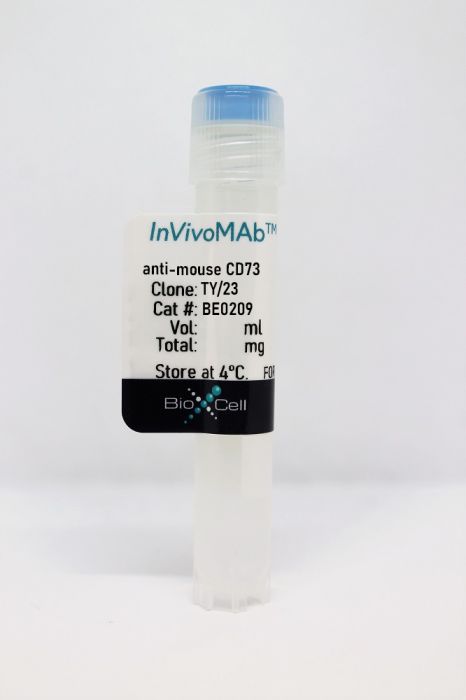InVivoMAb anti-mouse CD73
Product Details
The TY/23 monoclonal antibody reacts with mouse CD73 also known as ecto-5′-nucleotidase (5′-NT), a 69 kDa GPI-anchored cell-surface protein. In mice, expression of CD73 is restricted to CD11b+ myeloid cells in the bone marrow and T cells in the spleen. CD73 plays a strategic role in calibrating the duration, magnitude, and chemical nature of purinergic signals delivered to immune cells through the conversion of AMP to adenosine. This drives a shift from an ATP-driven proinflammatory environment to an anti-inflammatory milieu induced by adenosine. CD73 has been shown to be important for the immunosuppressive activity of regulatory T cells. The TY/23 antibody has been reported to inhibit the enzymatic activity of CD73.Specifications
| Isotype | Rat IgG2a, κ |
|---|---|
| Recommended Isotype Control(s) | InVivoMAb rat IgG2a isotype control, anti-trinitrophenol |
| Recommended Dilution Buffer | InVivoPure pH 7.0 Dilution Buffer |
| Conjugation | This product is unconjugated. Conjugation is available via our Antibody Conjugation Services. |
| Immunogen | BALB/c mouse spleen cells and CHO cells transfected with the mouse CD73 gene |
| Reported Applications |
in vivo CD73 blockade in vitro CD73 blockade |
| Formulation |
PBS, pH 7.0 Contains no stabilizers or preservatives |
| Endotoxin |
<2EU/mg (<0.002EU/μg) Determined by LAL gel clotting assay |
| Purity |
>95% Determined by SDS-PAGE |
| Sterility | 0.2 µm filtration |
| Production | Purified from cell culture supernatant in an animal-free facility |
| Purification | Protein G |
| RRID | AB_10950310 |
| Molecular Weight | 150 kDa |
| Storage | The antibody solution should be stored at the stock concentration at 4°C. Do not freeze. |
Recommended Products
in vitro CD73 blockade
Zhang, F., et al. (2019). "Specific Decrease in B-Cell-Derived Extracellular Vesicles Enhances Post-Chemotherapeutic CD8(+) T Cell Responses" Immunity 50(3): 738-750.e737. PubMed
Systemic immunosuppression greatly affects the chemotherapeutic antitumor effect. Here, we showed that CD19(+) extracellular vesicles (EVs) from B cells through CD39 and CD73 vesicle-incorporated proteins hydrolyzed ATP from chemotherapy-treated tumor cells into adenosine, thus impairing CD8(+) T cell responses. Serum CD19(+) EVs were increased in tumor-bearing mice and patients. Patients with fewer serum CD19(+) EVs had a better prognosis after chemotherapy. Upregulated hypoxia-inducible factor-1α (HIF-1α) promoted B cells to release CD19(+) EVs by inducing Rab27a mRNA transcription. Rab27a or HIF-1α deficiency in B cells inhibited CD19(+) EV production and improved the chemotherapeutic antitumor effect. Silencing of Rab27a in B cells by inactivated Epstein-Barr viruses carrying Rab27a siRNA greatly improved chemotherapeutic efficacy in humanized immunocompromised NOD Prkdc(scid)Il2rg(-/-) mice. Thus, decreasing CD19(+) EVs holds high potential to improve the chemotherapeutic antitumor effect.
in vivo CD73 blockade
Allard, B., et al. (2014). "Anti-CD73 therapy impairs tumor angiogenesis" Int J Cancer 134(6): 1466-1473. PubMed
CD73 is an ecto-nucleotidase overexpressed in various types of tumors that catabolizes the generation of extracellular adenosine, a potent immunosuppressor. We and others have shown that targeted blockade of CD73 can rescue anti-tumor T cells from the immunosuppressive effects of extracellular adenosine. Another important function of extracellular adenosine is to regulate adaptive responses to hypoxia. However, the importance of CD73 for tumor angiogenesis and the effect of anti-CD73 therapy on tumor angiogenesis remain unknown. In this study, we demonstrated that CD73 expression on tumor cells and host cells contribute to tumor angiogenesis. Our data revealed that tumor-derived CD73 enhances the production of vascular endothelial growth factor (VEGF) by tumor cells that host-derived CD73 is required for in vivo angiogenic responses and that endothelial cells require CD73 expression for tube formation and migration. Notably, the pro-angiogeneic effects of CD73 relied on both enzymatic and non-enzymatic functions. Using a mouse model of breast cancer, we demonstrated that targeted blockade of CD73 with a monoclonal antibody significantly decreased tumor VEGF levels and suppressed tumor angiogenesis in vivo. Taken together, our study strongly suggests that targeted blockade of CD73 can significantly block tumor angiogenesis, and further supports its clinical development for cancer treatment.
in vivo CD73 blockade
Allard, B., et al. (2013). "Targeting CD73 enhances the antitumor activity of anti-PD-1 and anti-CTLA-4 mAbs" Clin Cancer Res 19(20): 5626-5635. PubMed
PURPOSE: Monoclonal antibodies (mAb) that block programmed death (PD)-1 or cytotoxic T lymphocyte antigen (CTLA-4) receptors have been associated with durable clinical responses against a variety of cancer types and hold great potential as novel cancer therapeutics. Recent evidence suggest that targeted blockade of multiple immunosuppressive pathways can induce synergistic antitumor responses. EXPERIMENTAL DESIGN: In this study, we investigated whether targeted blockade of CD73, an ectonucleotidase that catabolizes the hydrolysis of extracellular adenosine monophosphate (AMP) to adenosine, can enhance the antitumor activity of anti-CTLA-4 and anti-PD-1 mAbs against transplanted and chemically induced mouse tumors. RESULTS: Anti-CD73 mAb significantly enhanced the activity of both anti-CTLA-4 and anti-PD-1 mAbs against MC38-OVA (colon) and RM-1 (prostate) subcutaneous tumors, and established metastatic 4T1.2 breast cancer. Anti-CD73 mAb also significantly enhanced the activity of anti-PD-1 mAb against 3-methylcholanthrene (MCA)-induced fibrosarcomas. Gene-targeted mice revealed that single-agent therapies and combinatorial treatments were dependent on host IFN-gamma and CD8(+) T cells, but independent of perforin. Interestingly, anti-CD73 mAb preferentially synergized with anti-PD-1 mAb. We investigated the effect of extracellular adenosine on tumor-infiltrating T cells and showed that activation of A2A adenosine receptor enhances PD-1 expression, but not CTLA-4 expression, on tumor-specific CD8+ T cells and CD4+ Foxp3+ T regulatory cells. CONCLUSIONS: Taken together, our study revealed that targeted blockade of CD73 can enhance the therapeutic activity of anti-PD-1 and anti-CTLA-4 mAbs and may thus potentiate therapeutic strategies targeting immune checkpoint inhibitors in general.



